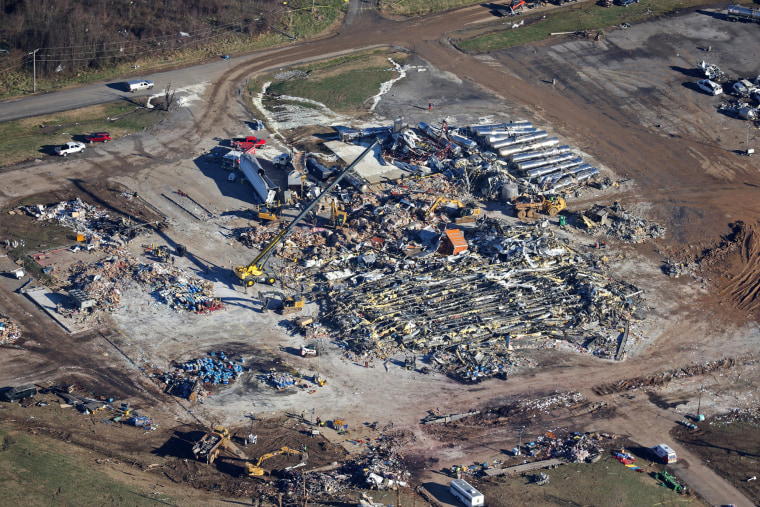Supervisors of a Mayfield, Kentucky, candle factory heard the tornado warning sirens, but employees say they were warned that they would be fired if they left their shifts early to shelter at home or anywhere else but their jobs at Mayfield Consumer Products, NBC News reported. Meanwhile, the company's CEO, Troy Propes, has publicly stated that no one was forced to stay, and another employee has said many workers actually left.
But if allegations against the supervisors are true, ordering employees to stay at their post during a catastrophic twister is morally indefensible. It's especially egregious because no one should risk their life to make candles. Eight people died in the factory.
If allegations against the supervisors are true, ordering employees to stay at their post during a catastrophic twister is morally indefensible.
Even if this factory had instead produced stethoscopes or aspirin, it would not have been worth risking one life to stay at the conveyor belt and make those things for one additional day. There is certainly zero need to risk lives to add, for example, sandalwood and vanilla bean fragrances to candles. I get that it's the holidays, and there's probably an increased demand for pine- and cinnamon-scented votives. But it's not worth sticking around to work during a tornado.
In fairness to the company, there may be several reasons why it might have seemed reasonable at the time to stay in the building. Tornadoes happen a lot. They're not often fatal. According to The Washington Post's analysis of data from the National Oceanic and Atmospheric Administration, from 1990 to 2019, there were 1,200 tornadoes a year on average, with an average of 68 deaths during that 29 year period.
Statistically, tornadoes are rarely deadly. If we're being fair, plenty of folks ignore tornado warnings if it interferes with their fun. The odds are that even if one touches down, it will be somewhere else and not in their backyard.
It comes as no surprise to anyone that the National Weather Service warns folks to get inside in the event of a tornado. The supervisors might have thought the employees were as safe inside at work as they would be at home. And, since they were at work anyway, well, the bosses probably thought: why not get back to that assembly line full of candles?
Whatever supervisors think about their workers' safety, employees should be able to make their own decisions during weather emergencies. This is especially so when employees have children at home who will be terrified without mom or dad.
Undoubtedly, there will be investigations into the safety choices of the company, and lawsuits will likely follow. There will almost certainly be workers' compensation claims.
But are natural disasters compensable under workers' compensation statutes?
Like many states, in Kentucky, every employer is liable — whether or not the employer is at fault — for compensation to employees for injury or death arising out of and in the course of employment. To be eligible for workers' compensation, the Mayfield candle employees would be required to prove this.
If you ask any number of injured employees or the lawyers who represent them, companies frequently dispute comp cases.
Kentucky courts have held since the 1940s that if employment exposes employees to the unique danger of a natural disaster (like lightning) and they're struck while working, their injuries "arise" from their employment for compensation purposes. However, the key is this: The risk of that job must be greater than that to which others of the public are exposed. If it's equally possible that the employees could have been hurt by a tornado at home, these workers may not be eligible for compensation.
Of course, the noble thing for the company to do would be not to fight compensation claims (usually a worker's only option for recovery), but if you ask any number of injured employees or the lawyers who represent them, companies frequently dispute comp cases.
Mayfield Consumer Products could certainly argue that it can't be liable for a natural disaster, no more than it could be responsible for meteor strikes or locusts. For compensation purposes, the owners may have a point. The company may also double down on Propes' statement and argue that an order was never given to the supervisors to direct employees to stay and that the supervisors based this warning on suspicion and conjecture. Still, the actions of supervisors can impose liability on the company.
The company may also argue that even if the supervisors did order employees to stay, an employee could've chosen their lives over their jobs, and in that sense, they were "free to leave" any time. It's not a great argument and would not likely go over well with the public.
Ultimately, an investigation will come down to two issues: The first is whether supervisors in fact warned employees against leaving. But the second issue will be how the company assessed the threat in real time. If the standard is that all employees should always go home immediately at any tornado warning, then it won't be too hard to hold the company responsible. But practically speaking, the rule is probably something less than that. Commerce doesn't come to a complete halt when there's a tornado warning because, well, as a society, we're really not that afraid of tornadoes. Many of us assume that a tornado will always hit someone else — until it hits us.

